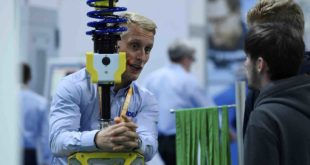International thought leaders will join the next generation of engineers in London this year for the Royal Academy of Engineering, will be held at the Queen Elizabeth Hall on London’s South Bank from 16th to 18th September and aims to help inspire and equip future engineering leaders to address the rapidly evolving challenges of an unpredictable world.
More than 30 speakers have been announced and former Wired UK editor David Rowan will host the Summit.
Engineering in an unpredictable world marks the start of a second series of summits jointly hosted by the UK, US and Chinese academies of engineering.
Inspired by the 14 Grand Challenges for Engineering, the summit will challenge engineers to address these, as well as the issues set out in the United Nations Sustainable Development Goals, with a particular focus on sustaining a world of 10 billion people, and ensuring that AI and other transformational technologies have a positive impact on humanity.
Delegates will debate how best to embed collaboration, diversity, and global responsibility into the solutions they create, and how to transform the way engineers work, think and are taught.
Sessions at the summit will cover the relationship between AI and the world of work, the development of responsible technology, the role of engineering in reducing the risks of climate change, and how the profession can help build sustainable living spaces that meet the needs of an increasing population.
More than 900 delegates are expected to attend, including leading and emerging engineers, researchers, innovators, entrepreneurs, and policymakers.
Professor Dame Ann Dowling OM DBE FREng FRS, President of the Royal Academy of Engineering, says: “Our world is at a critical juncture. The United Nations has predicted that the global population is due to reach 10 billion by 2050 and we have less than ten years to meet the targets of the Sustainable Development Goals.
“At the same time, rapid technological developments have the potential to change society for the better but have come hand-in-hand with unanticipated consequences.
“To make a difference we need to work collaboratively across and beyond the engineering profession and transform these rapidly evolving, unpredictable challenges into manageable ones.
“Engineering in an unpredictable world will kickstart new international, diverse and cross-disciplinary partnerships that work towards a sustainable future and inspire the next generation of engineering innovators to make the world a better place for the citizens of 2050.”
Dr John Anderson, President of the US National Academy of Engineering (NAE), says: “Ten years ago, the NAE’s Grand Challenges for Engineering report laid out a set of example goals that illustrate how engineers can contribute to tackling a range of unprecedented challenges facing the world. We are excited that these findings have inspired young people internationally through initiatives like this Summit series and the university-level Grand Challenges Scholars Program.
“Engineers play a crucial role in addressing today’s and tomorrow’s complex challenges in order to sustain our planet while improving the quality of life in an interdependent global society.”
Professor Xiaohong Li, President of the Chinese Academy of Engineering, says: “Engineering will play a leading role in the solutions for tackling global challenges and achieving sustainable development. This requires further advancing engineering and technological sciences, and developing innovations across the boundaries of traditional disciplines.
“Solving the grand challenges will also require contributions from many professions in addition to engineering. It is hoped that the Global Grand Challenges Summit will inspire current and future engineers, together with professionals in other related fields from all over the world, to collaborate to address global grand challenges, and to jointly build a community with a better, shared future for mankind.”
Ahead of the summit, on 12th-16th September, teams of undergraduates from the UK, US and China will compete to develop the best idea to address one of the sub-themes that will be discussed at the summit: the impact of AI and resources for a global population of 10 billion.
The Collaboration Lab competition is the culmination of a six-month programme of challenge-led innovation, design and business development for the students.
Initially the winning teams from each nation will pitch their proposals to a panel of senior judges in London. Then the teams will be reassembled into mixed country teams to tackle the same issues in a new way, to demonstrate the power of diversity and cross-cultural working.
 Engineer News Network The ultimate online news and information resource for today’s engineer
Engineer News Network The ultimate online news and information resource for today’s engineer


